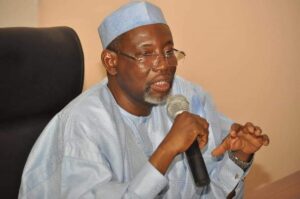Cost of Governance: ICPC calls for end to yearly project duplication, other corrupt activities in Nigeria
By Ogaga Ariemu
Chairman of Independent Corrupt Practice Commission(ICPC), Professor Bolaji Owasonoye, stakeholders have said the cost of governance in Nigeria is no longer sustainable, called for an end to the annual duplication of projects, reduction of ministerial seats and political appointments.
The Chairman of the ICPC, Prof Bolaji Owasonoye, Director- General Budget Office of the Federation, Ben Akabueze made this known to NewsDirect during a conference titled, ‘Policy dialogue on corruption and cost of Governance in Nigeria’ orgainzed by the commission in Abuja on Tuesday.
Prof Bolaji noted that the timing of this policy dialogue on Corruption and Cost of Governance could not have been at a better time than now. He stressed that the issue must be addressed if the Nigerian economy must improve.
In his words: “This is because there is near consensus across all political divides of the Nigerian polity that the cost of governance is high and also no longer sustainable given the continuing shortfalls in the accruing revenue to the nation. In the midst of serious security challenges and increasing borrowing, it is common sense to Re-evaluate again and again, the cost of governance.
“One recurring decimal in discussion within the arms and levels of government, the populace and the media is that the high cost of governance is fueled by partially by corruption and secondly by incompetence and waste in the governance structure and process of the nation. Corruption and its effects on the cost of governance therefore needs a special focus.”
The ICPC boss went on to speak on project duplication saying thousands of projects are repeated annually in the budget without diligent scrutiny. He explained that some are duplicated as annual zonal intervention projects otherwise called constituency projects of the legislature while also featuring as projects of the executive.
“Funding is released for both insertions without any mechanism for monitoring and evaluation and reconciliation of funding. Recently the RCCG blew the whistle on a road project it had implemented as CSR but which suddenly was “inadvertently” awarded as executive project. The incident rightly became the subject of an inquiry by the legislature. ICPC’s response to this challenge is not only to track selected projects but to annually digitize executive and constituency projects and upload same on our website for citizen verification through our toll free line.”
Also in his presentation the Director General of the Budget Office, Mr Ben Akabueze disclosed that Ministries should be downsized in order to reduce the cost of Governance in Nigeria.
Akabueze hinted that reduction of the number of cabinet Ministers from around 40 to only 24, stressing that among other things it will help in reducing the high cost of governance in Nigeria.
Akabueze also called for the amendment of the 1999 constitution to restructure the federation to 6 regions rather than 36 states, explaining the at the moment the president is mandated to appoint at least one minister from all the states, which he said is one of the major drivers for the high cost of governance.
The DG said: “It is imperative to minimize corruption and reduce governance cost in Nigeria to engender development. Critical steps to take include: Prioritizing the completion of on-going projects to enable us reap the benefits of such projects and save variation costs; Allowing only properly conceptualized, designed, costed and critically appraised projects.
“Exclusion of projects that relate to matters that are the responsibilities of state and local governments; and Exclusion of recurrent expenditure items from the capital budget.
stressing that among other things will help in reducing the high cost of governance in Nigeria. Amend the constitution to restructure the federation to 6 regions, instead of 36 states.
“In addition, the constitutional provision on appointment of Ministers needs to be amended to reduce the number of cabinet ministers the President is obliged to appoint to not more than 24 to be appointed from the six geopolitical zones. Reduce the number of federal ministries from 27 to not more than 20
USA with fifty (50) States and Washington D.C. has fifteen (15) Departments/Ministries.”
Meanwhile, this follows investigations by BudgIT, a civic-tech non-profit organisation in Nigeria which revealed that the 2021 budget of the Federal Government contains 316 duplicated projects valued at N39.5 billion. BudgIT said its investigations revealed that 115 of the duplicated projects were from the Federal Ministry of Health, describing the development as disturbing.
The advocacy organisation said, “Our investigations into the 2021 budget revealed at least 316 duplicated capital projects worth N39.5bn, with 115 of those duplicate projects occurring in the Ministry of Health.
“This is very disturbing especially considering the health infrastructure deficit and the raging COVID-19 pandemic affecting Nigeria.”




